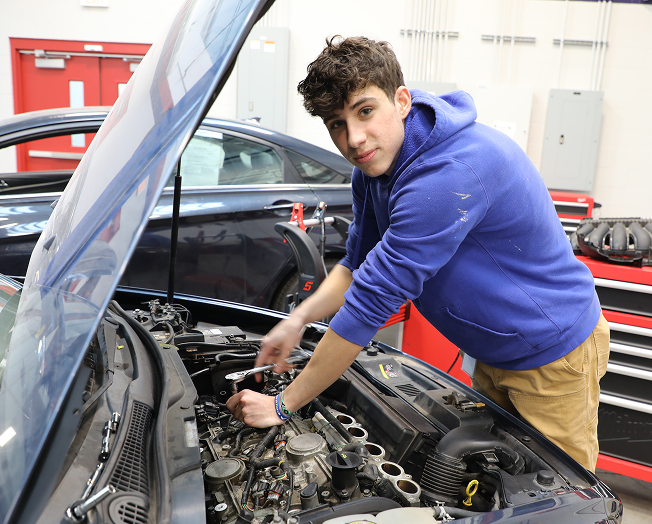Architecture Technology
This program educates students in the methods of technical design as applied to the
building process. Its curriculum includes teaching techniques, graphic representation,
work force skills, computer-aided drafting (CAD), and Building Information Management
(BIM) via enhanced software applications. Graduates are prepared to analyze, synthesize,
and evaluate buildings to produce effective technical design solutions and assume
integral positions within architectural firms.
Automotive Service Technician (AOS)
This AOS degree is a cooperative program where half of student learning is delivered
through coursework at SUNY Erie and the other half from work-based learning experiences
at partnering automotive repair facilities. It provides students with the necessary
knowledge and experience to be a successful automotive service technician and affords
them practical opportunities to sharpen their skills and abilities. Graduates are
employed as technicians, lead technicians, assistant foremen, shop foremen, parts
managers, service managers, or salespersons.
Automotive Technology
This program prepares graduates for the challenges of the auto industry. The curriculum
provides both theoretical and practical knowledge as students learn about electrical
systems, transmissions, trans-axles, engine performance, fuel and emissions, alignment
and suspension, air conditioning and heating, as well as mastering computer-assisted
mechanisms, and New York State inspection requirements.
Building Management & Maintenance
This program prepares graduates for key positions in facility operations and property
management. Students gain knowledge in the following areas: operation of a building's
mechanical system; overview of the building trades; and managerial/supervisory skills
and business practices. The training also includes computer simulations that provide
both problem solving and troubleshooting skills, as well as a curriculum with hands-on
activities.
Civil Engineering Technology
This AAS degree provides students with basic training in the concepts fundamental
to the development, design and construction of commercial, industrial, and public
structures, utilities, and highways. A minimum grade point average of 2.0 is required
for graduation.
Collision Technology
This AOS degree program qualifies graduates for employment as collision technicians,
painters, damage estimators, shop managers, detailers, and paint/body repair product
manufacturers. Students acquire these skills through a combination of coursework completed
in lectures, coupled with hands-on experience in labs at SUNY Erie or through internship
opportunities at local automotive collision facilities.
Computer Science
This program provides the coursework for the first two years of a four-year degree
in computer science. It prepares students for transfer to four-year institutions as
third-year students in a computer science program. Courses focus on communicating,
designing logical programs, working as a member of a project team, and understanding
potential areas of application.
Construction Management Engineering Technology
Objectives for this program are to secure employment in a technical career related
to construction management and continue education to a four-year construction management-related
program. Students receive a sound education in both the theory and the application
of quality construction principles for a variety of construction projects. They also
learn the basic methods, materials, techniques, and developments involved in the construction
industry.
Electrical Engineering Technology
This program prepares students for entry-level skills as technicians in the fields
of electronics, computers, communications, instrumentation, automation, and power.
It also provides the basis for transferring to a four-year engineering technology
program. Students receive a solid foundation in electrical and electronics theory
and hands-on laboratory experience. Computer simulation and applications are an integral
part of the curriculum.
Engineering Science
This program is designed to qualify students for transfer to a four-year engineering
program. Classes at the North Campus are small, and, in this intimate setting, learning
is greatly enhanced. The curriculum includes courses in English, social science, advanced
mathematics, physics, and chemistry. Students also take prescribed engineering courses
designed to facilitate transfer to baccalaureate engineering programs.
Environmental Science
This program provides students with the knowledge and technical experience needed
to transfer to a four-year degree program in environmental science, environmental
biology, or environmental studies. Through laboratory-oriented, multi-disciplinary
coursework, students gain a broad and integrated knowledge base of the basic sciences,
as well as knowledge of issues focusing on environmental integrity, sustainable resources,
and ecological problems.
Industrial Technology
This program provides training for CNC Machining and Programming and General/ Custom
Technology Degrees - Quality/ Manufacturing.
Information Technology
This AAS degree provides students with the skills needed to succeed in today's digital
world. For the first year of study, students acquire a broad business and real-world
perspective of information technology. In the second year, students choose one of
five areas in which to specialize: cybersecurity, management information systems,
networking, Oracle Academy Database, and programming. Graduates secure employment
in technical support, programming, and other computer-related fields or continue their
computer education at four-year institutions.
Mechanical Engineering Technology
This program offers an in-depth study of mechanical engineering technology courses,
as well as liberal arts and social science courses. Analytical mechanics, strength
of materials, fluid mechanics and electricity for mechanical equipment are among the
subjects covered in the curriculum. Graduates either assume positions as mechanical
technicians or continue their education toward a bachelor or advanced degree in engineering
or technology.

